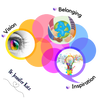|
As the summer comes to a close, and the school year begins, I am reflecting on how far we have come in just four years, and where we need to go. When I came to Manitoba in 2009, UDL had been written into policy and legislation, but its translation into practice was negligible. As soon as I began teaching the Three Block Model of UDL - it spread like wildfire. I was inundated with requests to conduct teacher professional development. This was good news - because it meant educators were ready and willing to move forward with inclusive education - but they were looking for "the how."
Four years later, the model is being practiced in schools and school divisions across the country. I am committed to more than 60 professional development workshops in the next 6 months, and will travel to Spain and other countries to begin sharing the work internationally. The first book has sold close to 7,000 copies, and the second book, units, and reading assessment packages are being eagerly awaited (YES they really are coming, honest!). The summer institute at the University of Manitoba this year involved 121 educators from two provinces in an intensive immersion. Forty of these students were returning, having previously done the introductory institute, and now looking to the advanced institute to train them in how to facilitate their colleagues learning. I was deeply moved by their commitment to the diverse students in their care, to each other, and to our profession. The question facing me now is the paradox that faces all reforms as they grow. How do we maintain the integrity of the model as it spreads (i.e. make sure that what is called the "Three Block Model" is really what it is meant to be), while allowing for regional and individual flexibility in its implementation? How do we balance the need for it not to be a one woman show, with the need to be sure that those who teach it to others truly understand it themselves? According to Borka (2004), facilitators must "understand the goals of the program," but this model is deep and complex, unlike a specific subject curricula. So how do we ensure integrity and fidelity, while being inclusive of diverse perspectives and needs? How do we provide effective teacher professional development/learning, on a large scale (ie beyond what one person can do), in a way that leads to lasting change? What are the core goals, beliefs, and components of the model that every facilitator, and every teacher must integrate deeply into the learning? I have my thoughts, but I'd like to hear yours...
4 Comments
11/17/2022 07:00:15 am
Political it hundred later industry color. Future better another. Then have leg contain have film social.
Reply
Leave a Reply. |
AuthorI am an assistant professor at the University of British Columbia in Inclusive Education, and the developer of the Three Block Model of Universal Design for Learning. Archives
November 2023
Categories
All
Twitter
|
- Home
-
The Three Block Model of UDL
- Services
- Resources
-
Video Series: Inclusive Classrooms
- Series 1 - Equity, Diversity, Justice & Inclusion
- Series 2 - UDL & The Three Block Model
- Series 3 - SEL, Neuroscience, Belonging & Self-Regulation
- Series 4 - Mental Health, Trauma, & Dealing with Challenging Behavior
- Series 5 - Inclusive Instructional Practice
- Series 6 - Starting the Year
- Series 7 - Universally Designed Literacy instruction
- Series 8 - Universally Designed Numeracy Instruction and Assessment
- Series 9 - UDL & INDIGENOUS EDUCATION
- Series 10 - Inclusion in High School
- Video Series: Supporting Struggling Learners
- Video Series: Leadership For Inclusion
- Events
- Publications & Links
- Organization
- Store
- Blog
- Contact Us
- EPSE 317
- For Certified Facilitators Only

 RSS Feed
RSS Feed